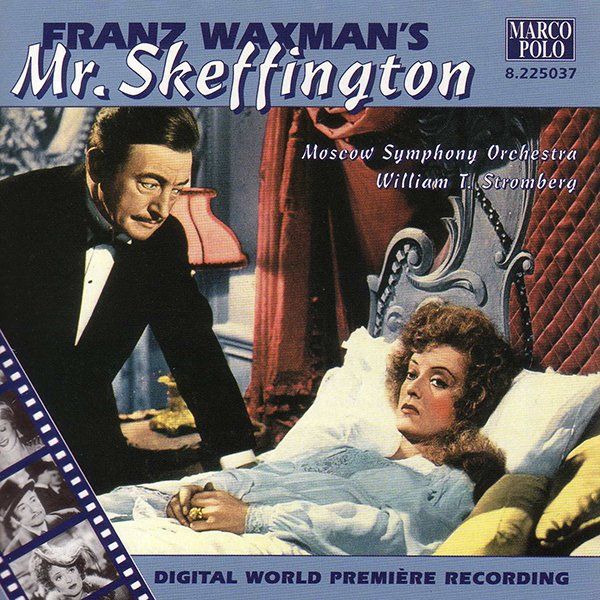Mr. Skeffington

Label: Marco Polo
Catalogue No: 8.225037
Release Date: 1999
Total Duration: 62:24
UPN: 0636943503720
Moscow Symphony Orchestra conducted by William Stromberg
Bette Davis knew the value of film music. She keenly appreciated its power to flatter her and support her portrayals, focusing and intensifying the emotions of her characters and, often, revealing contradictions in their personalities. Davis took a keen interest in the composition of the music for her films. At Warner Bros, where she was under contract from 1932 to 1949, her films were scored by Erich Wolfgang Korngold, Franz Waxman and Max Steiner. They would all become very familiar with her screen characterisations. [Her favourite was Max Steiner, who contributed music for most of them - 20 in all.] But of Waxman's score for Mr Skeffington, Bette Davis told the composer's son, "Yes, now that was music!"
Excerpts from the scores of many Bette Davis's films were included in Charles Gerhardt's Classic Film Scores albums, notably Classic Film Scores for Bette Davis (RCA VICTOR GD80183) which included the strikingly atonal and advanced cue, 'Forsaken' from Mr Skeffington (Warner Bros. 1944). Fittingly, therefore, this new Marco Polo release carries the dedication - In Memory: Charles Gerhardt. [Gerhardt died on this year]
In fact 'Forsaken' is one of the two climactic and most impressive cues in this new album. But first, a brief description of the film. Fanny Trellis (Bette Davis) marries the gentle rich Jew, Job Skeffington (Claude Rains) for his money but persists in her hedonistic lifestyle which includes many admirers. Eventually, an attack of diphtheria robs her of her beauty leaving her an ugly disfigured woman. Her suitors now only visit her because she might have money. Job returns after many years wandering about Europe on his own, and after suffering under the Nazis. He is blind and therefore oblivious of her disfigurement and so the film ends with Fanny at last finding fulfilment with her estranged husband.
Mr Skeffington was poorly received by critics and public alike when it was first released and not really appreciated until much later when it was seen by new audiences on TV. Waxman's score is film music of a very high order played by the Moscow SO on top form. They have clearly got into the stride of this series now and this is one of their best releases to date.
Waxman's score is heavily influenced by the richly romantic music of Richard Strauss. It is apparent in the brief storm music, in the wry humour that pervades much of the score especially in the scenes involving Fanny's many suitors where Waxman pokes mischevious fun at their foibles and, most dramatically, in the scene (the cue 'Finale') where Fanny descends the staircase to meet her now blind husband; here the music has quite eeie parallels with the Marschallin of Der Rosenkavalier.
The two main themes of Fanny and Job dominate the score. The former theme winds its way through self-indulgency to despair as illness ravages Fanny's beauty, to a glorious affirmatory 'Finale' as Job and Fanny are reunited. The music for Job on the other hand speaks of a stoic dependability and gentlemanly dignity. Much of the score's darker material surrounds the irresponsible activities of Fanny's self-destructive brother Trippy who is eventually killed in World War I which is held at a distance while Fanny continues to live life to the hilt. For the cue 'Forsaken', Waxman creates a disturbing, disorientated atonal atmosphere as the music swirls around Job's theme. Fanny, utterly desolated, finally accepts her predicament and at last appreciates the sterling worth of the husband she has largely ignored.
Waxman creates a sound world, which brilliantly evokes the sound and spirit of the age in which the film is set. In the orchestra you hear the honking of the automobiles as the first of Fanny's suitors arrive vying for her attentions, and you share the jazzy excitement and terror of the prohibition period. Waxman's gift is so acute that by some extraordinary alchemy Waxman he even succeeds in suggesting Davis's very individual gait. Strongly recommended.
Originally published @ MusicWeb International © 1999 / Text reproduced by kind permission



